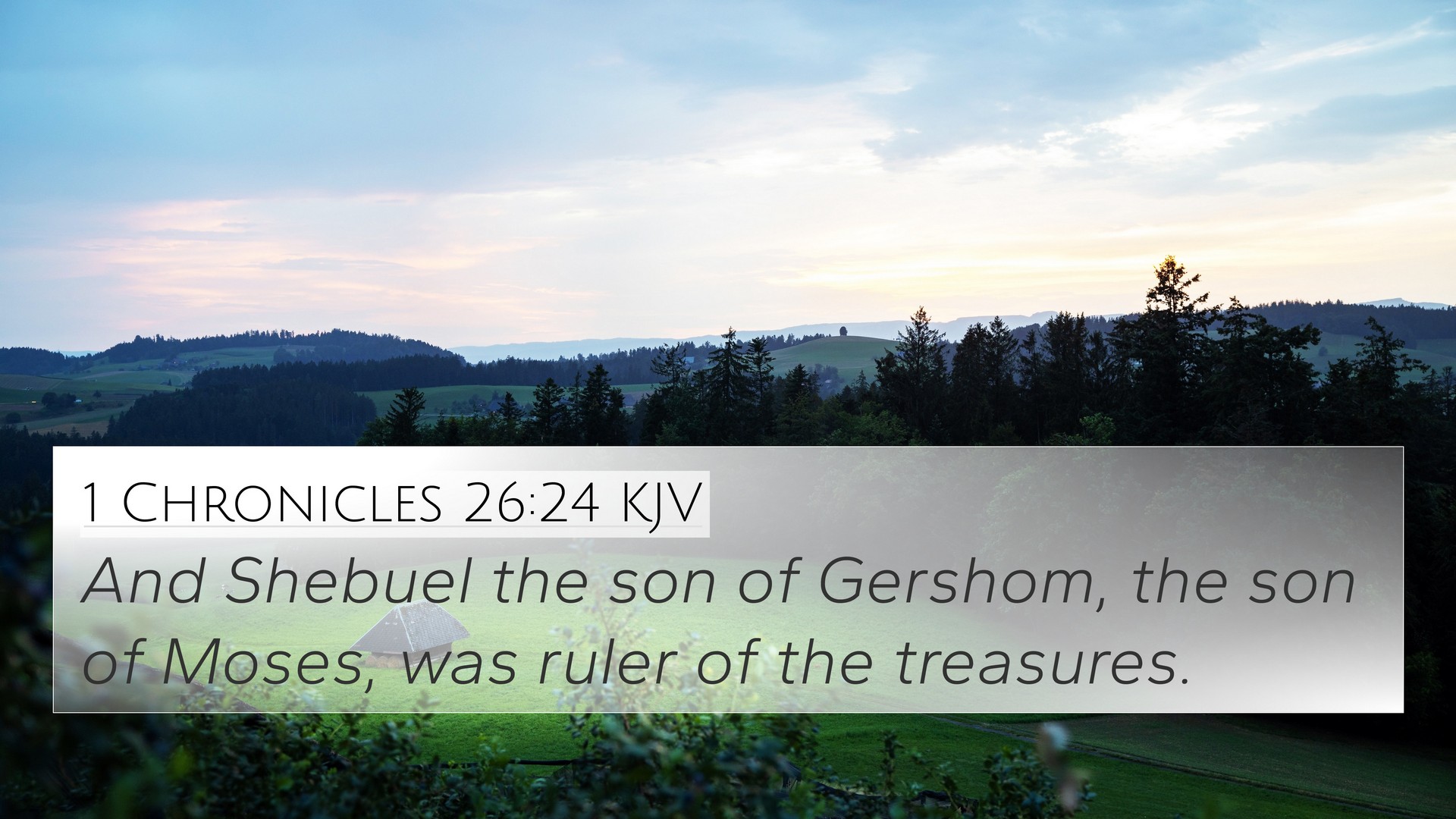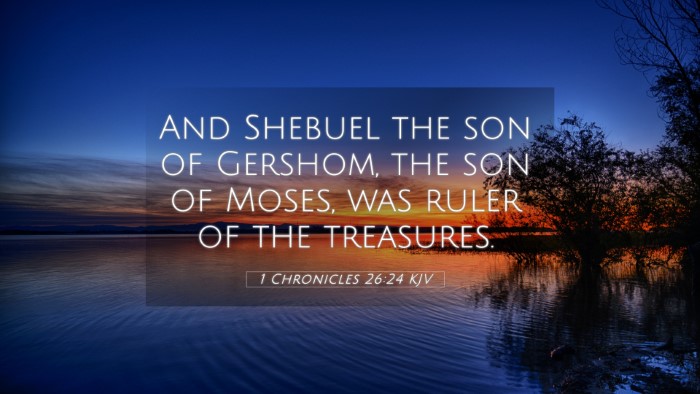Understanding 1 Chronicles 26:24
The verse in 1 Chronicles 26:24 reads:
"And Shebuel the son of Gershom, the son of Levi, had the oversight of the treasures of the house of God."
This verse, although seemingly straightforward, presents an intricate web of themes related to leadership, stewardship, and the administration of God’s house.
Historical Context
To fully grasp the meaning of 1 Chronicles 26:24, it is essential to consider its historical context. The book of Chronicles was written to recapitulate the history of Israel, emphasizing the importance of David's reign and the subsequent establishment of worship in Jerusalem. As we delve into various commentaries, we discover multiple layers of interpretation and significance.
Commentary Insights
Matthew Henry on 1 Chronicles 26:24
Matthew Henry emphasizes the role of Shebuel as a steward of the treasures of the house of God. He notes that this responsibility reflects the trust placed in the Levitical lineage, demonstrating that the oversight was not only a duty but also a privilege. Henry believes that being entrusted with God’s treasures symbolizes a divine call to faithfulness and integrity in spiritual matters.
Albert Barnes' View
Albert Barnes provides an analysis of the administrative structure within the Levitical priesthood. He indicates that Shebuel's position correlates with broader themes of organization and discipline in worship practices. Barnes stresses that clear leadership is essential in the ecclesiastical stewardship of resources. This reflects a well-ordered approach to worship that facilitates proper service to God.
Adam Clarke's Perspective
Adam Clarke underscores the importance of the role of Shebuel in relation to the Levities. He comments on the significance of lineage and the specific calling tied to family heritage within the priesthood. Clarke views this as indicative of God's guidance in establishing roles and responsibilities, reinforcing the importance of tracing spiritual heritage and its implications for contemporary faith communities.
Thematic Connections
Several key themes arise from the interpretation of this verse. Firstly, the themes of stewardship and responsibility are paramount. Shebuel encapsulates the ideal of a faithful steward tasked with preserving and managing sacred resources.
- Stewardship: The careful management of God's resources is a recurring theme in the Bible (see 1 Peter 4:10).
- Leadership: Qualified leaders are essential for the growth and integrity of the church (see Acts 20:28).
- Heritage: The significance of family lineage in spiritual matters is vital for understanding God's plan (see Ephesians 2:19-22).
Bible Cross References
The following Bible verses provide connections and parallels to 1 Chronicles 26:24, enriching our understanding through scriptural cross-references:
- Exodus 28:1: The importance of consecrated service among the Levites.
- 1 Peter 2:9: A royal priesthood – the concept of believers as stewards of spiritual treasures.
- Matthew 25:21: The parable of the faithful steward, a reminder of accountability.
- 2 Chronicles 31:12: The provision for the priests and Levites, relating to the management of goods.
- 1 Timothy 3:1: The call to leadership and qualification for overseers.
- Acts 6:3: Selection of leaders to manage resources effectively.
- Hebrews 7:14: The connection between the priesthood of Levi and the priesthood of Christ.
Application for Today
The implications of 1 Chronicles 26:24 extend beyond its historical setting. For modern believers, it serves as a reminder of the significance of stewardship, both in a church context and in personal spiritual lives. The legacy of faithfulness in leadership can inspire current and future generations to uphold high standards of integrity and accountability in their dealings.
Additionally, understanding this verse encourages a deeper exploration of how various scriptures interconnect, enhancing the richness of biblical teachings. By employing tools for Bible cross-referencing, believers can discover many themes and teachings that resonate throughout the biblical narrative.
Conclusion
In summary, 1 Chronicles 26:24 invites us to consider the responsibilities bestowed upon leaders within the community of faith. The insights from Matthew Henry, Albert Barnes, and Adam Clarke reveal the depth of this scripture, highlighting themes of stewardship, leadership, and heritage. Through attentive Bible verse cross-referencing, we can uncover the connections that enhance our scriptural interpretation and, ultimately, our walk of faith.




